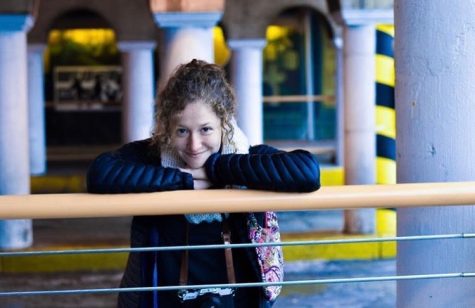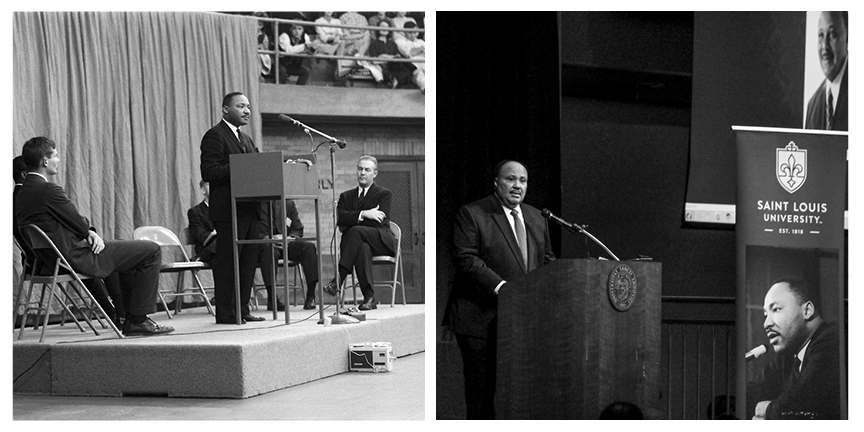Still Struggling with Injustices and Striving for Reform
Martin Luther King Jr. visited SLU in 1964, two days before he won the Nobel Peace Prize and two months after his “I Have a Dream” speech. On the right, his son, Martin Luther King, III, visited SLU on Jan. 17 to commemorate his father and discuss the same injustices that are still prevalent from his father’s time. Photo Courtesy of SLU Archives (left) and Emma Carmody (right)
Both the young and old, white and colored, religious and non- congregated in a mass of over 250,000 at the Lincoln Memorial to hear Martin Luther King Jr.’s “I Have a Dream” speech. Over 50 years later, Washington has become progressively divided with news of a standoff between a Kentucky student and Native American man, the partial government shutdown over a border wall and immigrant children being torn from their parents.
On Jan. 17, King’s eldest son, Martin Luther King, III, visited Saint Louis University, and he addressed these current issues, pivoting toward a call to action to restore democracy. In his tribute to his father, he expressed the late King’s dream of coming together as a unified nation.
MLK III’s speech took place at 9 a.m. in the Wool Ballrooms and marked SLU’s celebration of Martin Luther King Day. Impassioned by the current racial injustices, he argued that America has forgotten about its roots.
“We really can’t celebrate [Martin Luther King Jr.’s birthday] when we live in a country that pays women who do the same job as men for less,” he said. “We really can’t celebrate when we have racial injustice that carries not some days, but every day. We really can’t celebrate when our children, black and brown and poor white children, are failing out of our schools. We can’t celebrate when we are dividing families in this nation we call ‘home.’”
Referencing President Trump’s family separation policy, he asked the audience, What is wrong with the nation? How are we in America? America was built by immigrants. The late King opined that there is no definitive American culture. Rather, it is a concoction of cultures. If people were asked to trace their origins today, many would say they are not from pure Native American descent–which is, ironically, one of the targeted groups by others who have negated their own origins.
MLK sought to bring racial inequality to the forefront of discussion through nonviolence. His son referenced how movements, such as Black Lives Matter, are similar and have erupted due to these same injustices, but specifically within the law enforcement sector.
“Black Lives Matter is a very important group, and Black Lives Matter does not just encompass black folks,” MLK III said. “People of goodwill have joined Black Lives because anybody, even people who can’t see, see injustice. People come together and say ‘This is not right.’ Over and over and over again, black people are being gunned down.”
He used the example of police brutality as a call to action. He stressed that the American people can rewrite this narrative.
He argued for the implementation of police training programs to educate all law enforcement personnel.
He argued for programs to bring police and average youths together, so they could have a continuous dialogue to help prevent violence.
He argued for independent citizen community review boards in every city to improve police community relations.
Ever more pressing is the mass shooting epidemic. “Something is wrong in our society when we have massacres even in our places of worship, as well as in elementary schools, movie theaters and at musical concerts,” MLK III said. “[…] My daughter said something profound at the March for Our Lives. She said, ‘My grandfather had a dream that one day children would not be judged by the color of their skin, but by the content of their character. But I have a dream also: My dream is to have a gun-free world.’”
It can still happen, he argued. There are ways people can still protect themselves, without owning assault weapons. “There will be other mass shootings, unless we energize a movement for gun safety in the U.S.,” he said.“We have a higher tolerance for politicians who allow for psychopaths to have deranged weapons of mass murder, and that is a problem that needs to be corrected.”
Another area of foreign concern is the dream of MLK: achieving a just immigration policy. In his lifetime, and ever prevalent in his “I Have a Dream” speech, MLK fought for the need to bridge the haves and have nots. Every person of race and religion should live in harmony “because they are all children of the same God,” MLK III said.
Working toward social change means eradicating imbalances and progressing with MLK’s vision in mind.
Your donation will support the student journalists of Saint Louis University.

Staunch entered SLU as a Biomedical Engineering major on a Pre-med track, with the intention of continuing her studies in medical school. After a year and a half at SLU, she realized she missed the balance of the arts with sciences as she was previously an editor in her high school yearbook committee.
"Working for UNews, whether it was as Associate News Editor, Managing Editor, or Editor-in-Chief, has taught me the value of working on tight deadlines and how to adequately adapt to certain unexpected situations. The field of Journalism is incredibly fast paced - but that is why I love it so much," Staunch said. "There is always something new occurring, and you would not be able to effectively complete your job unless you had the support of your other editors and staff."
Though paradoxical in nature, she switched her major to Communication. She wants to incorporate both her analytical and creative sides to report on medical topics. Her dream job: to write for Discover Magazine.
When Staunch is not in the newsroom, she is captaining the women’s Ultimate Frisbee team at SLU. She began playing her freshman year and enjoys it as an outlet.




